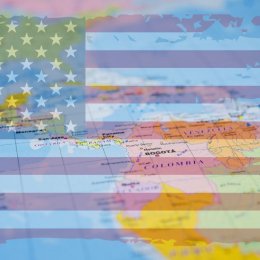- Norwich Blogs
- Blogs
- The New Cold War and North Korea
The New Cold War and North Korea
By Jihwan Hwang
The author argues that North Korea’s recent behavior — marked by ballistic missile tests and the launch of a military satellite in November 2023 (reportedly aided by Russia) — reflects Pyongyang’s embrace of a “new Cold War” framework, pitting the U.S., Japan and South Korea against China, Russia and North Korea. Kim Jong Un views this emerging bipolar or multipolar global order as advantageous, enabling North Korea to shed its isolation by aligning strategically with Moscow and Beijing. However, both China and Russia continue to exploit North Korea for geopolitical leverage rather than as fully dependable allies. Within this revived Cold War context, Pyongyang’s aggressive military posture — including a nuclear doctrine that explicitly allows first use under certain conditions — poses a heightened security threat on the peninsula.

Disclaimer: These opinion pieces represent the authors’ personal views, and do not necessarily reflect the official policies or positions of Norwich University or PAWC.
The Democratic People’s Republic of Korea (DPRK) poses a significant threat to the international community. Recently, it has exhibited aggressive behavior by test-firing numerous ballistic missiles and launching a military reconnaissance satellite. Notably, the successful launch of a military satellite in November 2023, following two failures the previous year, appears to have been aided by Russia, as indicated during the Russia-DPRK summit in September 2023. North Korea is now aiming to establish a new security environment on the Korean Peninsula while reinforcing its perception of a new Cold War order. Kim Jong Un, the third-generation leader of the Kim regime, has frequently stated that the structure of international relations has shifted into a new Cold War framework.[i]
Kim’s perception of the new Cold War order reflects the US-China strategic rivalry and the changed international situation since Russia's invasion of Ukraine in February 2022. He seems to believe that this new Cold War will create a security environment on the Korean Peninsula that favors North Korea. As the US-led unipolar world transitions into a bipolar or multipolar world, the power structure surrounding the Korean Peninsula changes significantly. Kim is determined to leverage these changes in international relations proactively.
As new Cold War tensions intensify, the North Korean situation can no longer be viewed through a post-Cold War lens. If the regional order around the Korean Peninsula again features a confrontation between the United States, Japan, and South Korea on one side and China, Russia, and North Korea on the other, North Korea may no longer be an isolated nation. Instead, Pyongyang could become strongly dependent on and supported by Moscow and Beijing. While Russia and China no longer view North Korea as a strong ally, nor does North Korea see them as entirely reliable patrons, both countries will continue to use North Korea strategically in their dealings with the United States. Pyongyang understands its position well and will seek to maneuver for its strategic advantage.
In this regard, Pyongyang’s relations with Beijing and Moscow present a grave challenge for the Korean Peninsula. An important aspect of its aggressive behavior stems from improving relations with China and Russia. North Korea has actively supported China amid various US-China conflicts and has staunchly defended Russia's invasion of Ukraine. Since the outbreak of the Ukraine War in February 2022, North Korea has provided Russia with numerous military supplies, including ammunition, artillery, and missiles.[ii] North Korea argues that the root cause of the Ukraine crisis lies in the hegemonic strategy of the United States and the West, asserting that Russia's demands are reasonable and just, and that the eastward expansion of the United States and NATO threatened Russia, leading to a serious military crisis. North Korea insists that no matter how strong the sanctions, threats, or intimidation, they cannot alter Russia's resolve to protect its national security and interests.[iii] In Russia’s war in Ukraine, North Korea has become more significant than before.
Pyongyang has also made efforts to strengthen its relations with Beijing. Kim Jong Un once noted that through five rounds of DPRK-China summits, the two nations have deepened strategic communication and mutual understanding, providing a firm foundation for further strengthening and developing their relationship.[iv] There are strategic and political considerations behind China’s position, as it has geostrategic national interests regarding North Korea. Although Beijing may not view Pyongyang as critically as it did during the Cold War, it still recognizes North Korea's strategic importance in East Asia. China sees North Korea as a buffer zone on the Korean Peninsula and leverages North Korean issues in US-China relations. Consequently, Beijing prefers the status quo on the Korean Peninsula and does not want the Kim regime to destabilize for any reason. There are significant concerns that if the Kim regime were to destabilize or collapse, millions of North Koreans might move into Chinese territory, leading to severe political, economic, and social instability in China's northeastern provinces.
While it remains uncertain whether the new Cold War order will solidify in the future, the changing world order has made Pyongyang more aggressive on the Korean Peninsula. In this context, Pyongyang’s new nuclear doctrine, announced in the Nuclear Forces Policy Law of September 2022, is significant. The law designates deterrence as the first mission and the use of nuclear weapons as the second mission while also stipulating five conditions that Pyongyang believes justify first use of nuclear weapons. Three of these conditions involve nuclear or non-nuclear preemptive attacks by hostile forces on North Korea, and the other two concern wartime operations and inevitable catastrophic crises. Kim Jong Un has implied that nuclear forces would have no choice but to execute their second mission unexpectedly if enemies threaten the DPRK’s fundamental interests. This first-use policy may include using tactical nuclear weapons on the Korean Peninsula. North Korea has plans to develop small tactical nuclear weapons, as well as medium-range and submarine-launched ballistic missiles. This suggests that Pyongyang is shifting its nuclear strategy from assured retaliation to asymmetric escalation, which carries much greater risks.
Although deterrence remains the primary focus, the asymmetric escalation strategy involves presenting a credible threat of nuclear first use against military and civilian targets and responding with rapid and asymmetric escalation. Under this strategy, Pyongyang is more likely to pre-delegate nuclear strike authority to lower-level commanders in the field to make the threat of nuclear first use more credible and deter an American and South Korean conventional invasion. This approach would operationalize nuclear weapons as war-fighting tools to enhance deterrence credibility. With this new nuclear strategy, North Korea may increasingly consider limited nuclear threats in conventional conflicts to gain a strategic advantage in Northeast Asia without provoking a strategic nuclear response from the United States. To prevent North Korea's aggressive actions from causing a new military crisis on the Korean Peninsula, it is necessary to understand the ways in which Pyongyang seeks to leverage the new post-Cold War climate in the region and explore new diplomatic initiatives with North Korea.
Jihwan HWANG is a Professor of International Relations at the University of Seoul, Korea. He was an instructor at George Washington University and taught inter-Korean relations. He was also a visiting scholar at The Catholic University of America. He has served in several advisory positions in the Korean government, including the Presidential Commission on Policy Planning, the Presidential Commission for Unification Preparation, the Ministry of Foreign Affairs, the Ministry of Unification, and the Ministry of National Defense. He is the author of North Korea, Nuclear Risk-Taking and the United States: Kim Il Sung, Kim Jong Il and Kim Jong Un (Lanham, MD: Lexington Books, 2024). His publications include “Disillusioning Pyongyang’s Nuclear Deterrence Strategy: nuclear asymmetry, conventional posture, and overdeterrence,“The North Korean Human Rights between China and South Korea,” “The North Korea Problem from South Korea’s Perspective,” “The Paradox of South Korea's Unification Diplomacy,” and other academic and policy papers. He graduated from Seoul National University and received his Ph.D. in Political Science from The University of Colorado, Boulder.
[i] “Kim Jong Un’s Policy Speech at the Supreme People’s Assembly of DPRK,” >Rodong Sinmun, September 30, 2021.
[ii] Michael D. Shear and David E. Sanger, “White House Says North Korea Providing Russia with Ballistic Missiles,” The New York Times, January 4, 2024.
[iii] “A Legitimate Choice,” The DPRK Ministry of Foreign Affairs, March 28, 2022.
[iv] “Kim Jong Un’s Report at the 8th Congress of the DPRK Workers’ Party,” Rodong Sinmun January 9, 2021.



